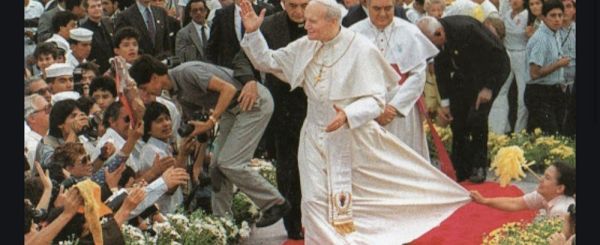Do you seek Jesus the Crucified? (Mt 28:5).
This is the question the women will hear when, "at dawn on the first day of the week" (Mt 28:1), they come to the tomb.
Crucified!
Before the Sabbath he was condemned to death and expired on the cross crying: "Father, into your hands I commend my spirit" (Lk 23:46).
So they laid Jesus in a tomb, in which no one had yet been laid, in a tomb lent by a friend, and they went away. They all departed, in haste, to fulfil the rule of the religious Law. For they were to begin the feast, the Passover of the Jews, the memory of the exodus from the slavery of Egypt: the night before the Sabbath.
Then the Easter Sabbath passed and the second night began.
2. And behold, we have all come to this temple, as have so many of our brothers and sisters in the faith to the various temples throughout the globe, that holy night may descend upon our souls and hearts: the night after the Sabbath.
You are here, sons and daughters of the Church that is in Rome, sons and daughters of the Church that is spread across countries and continents, guests and pilgrims. Together we experienced Good Friday: the Stations of the Cross among the remains of the Colosseum - and the adoration of the Cross until the moment when a large stone was rolled over the door of the tomb - and a seal was put on it.
Why have you come now?
Do you seek Jesus Crucified?
Yes. We seek Jesus Crucified. We look for him on this night after the Sabbath, which preceded the arrival of the women at the tomb, when they with great astonishment saw and heard: "He is not here..." (Mt 28:6).
We have therefore come early, already late in the evening, to keep vigil at his tomb. To celebrate the Easter Vigil.
And we proclaim our praise on this wonderful night, pronouncing with the deacon's lips the "Exsultet" of the vigil. And we listen to the sacred readings, which compare this one night to the day of Creation and especially to the night of the exodus, during which the blood of the lamb saved the first-born sons of Israel from death and brought them out of slavery in Egypt. And then in the moment of renewed threat the Lord led them out to dry in the midst of the sea.
Let us therefore keep vigil on this unique night at the sealed tomb of Jesus of Nazareth, knowing that all that has been foretold by the Word of God throughout the generations will be fulfilled on this night, and that the work of man's redemption will reach its zenith on this night.
Let us therefore keep vigil, and though the night is deep, and the tomb sealed, let us confess that the Light has already been kindled in it, and it walks through the darkness of the night and the darkness of death. It is the light of Christ: "Lumen Christi".
3. We have come to immerse ourselves in his death; both we who long ago received the Baptism that immerses in Christ, and also those who will receive Baptism on this night. They are our new brothers and sisters in the faith; hitherto they were catechumens, and this night we can welcome them into the community of the Church of Christ, which is one, holy, catholic and apostolic. They are our new brothers and sisters in the faith and in the community of the Church, and they come from different countries and continents: Korea, Japan, Italy, Nigeria, Holland, Rwanda, Senegal and Togo.
We greet them cordially and joyfully proclaim the "Exsultet" in honour of the Church, our Mother, which sees them gathered here in the full light of Christ: "Lumen Christi".
And let us proclaim with them the praise of the baptismal water, into which, through Christ's death, the power of the Holy Spirit has descended: the power of the new life that gushes forth for eternity, for eternal life (cf. Jn 4:14).
4. So even before dawn breaks and the women arrive at the tomb from Jerusalem, we have come here to seek Jesus Crucified,
for: "Our old man was crucified with him, so that... we would no longer be slaves to sin..." (Rom 6:6);
for: we do not consider ourselves "dead to sin, but living for God, in Christ Jesus" (Rom 6:11): "As for his death, he died to sin once for all; but now by the fact that he lives, he lives for God" (Rom 6:10);
for: "Through Baptism we ... have been buried together with him in death, so that, just as Christ was raised from the dead by the glory of the Father, we too may walk in a new life (Rom 6:4);
for: "If we have been completely united with him by a death like his, we shall also be completely united with him by his resurrection" (Rom 6:5);
for we believe: that "if we have died with Christ... we shall also live with him" (Rom 6:8);
and because we believe that "Christ risen from the dead, he no longer dies; death no longer has power over him" (Rom 6:9).
5. That is precisely why we are here. That is why we keep vigil at his tomb.
Let the Church keep vigil. And watch over the world. The hour of Christ's victory over death is the greatest hour in history.
[Pope John Paul II, homily at the Easter Vigil 18 April 1981]


